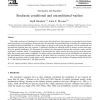Free Online Productivity Tools
i2Speak
i2Symbol
i2OCR
iTex2Img
iWeb2Print
iWeb2Shot
i2Type
iPdf2Split
iPdf2Merge
i2Bopomofo
i2Arabic
i2Style
i2Image
i2PDF
iLatex2Rtf
Sci2ools
85
Voted
EOR
2002
2002
Stochastic conditional and unconditional warfare
This article constructs a foundation for warfare at the individual level, where agents in two groups fire and absorb shots according to a non-stationary Poisson process. We determine for generalized forms of warfare the conditional and unconditional point probabilities of a certain number of agents in each group through time, and the conditional and unconditional expected sizes and variances. Conditional variables are especially useful in modern warfare since these allow for updated intelligence. We determine the conditions for discrepancies between the stochastic version and the associated Lanchester model. Correspondence is demonstrated for square warfare for large groups where the probability that a group goes extinct is negligible. For linear warfare equivalence occurs for the conditional case, whereas for the unconditional case correspondence arises at the limit where the covariance of the group sizes approaches zero. Finally the stochastic model is tested against newly released ...
EOR 2002 | Non-stationary Poisson Process | Unconditional Expected Sizes | Unconditional Point Probabilities |
| Added | 18 Dec 2010 |
| Updated | 18 Dec 2010 |
| Type | Journal |
| Year | 2002 |
| Where | EOR |
| Authors | Kjell Hausken, John F. Moxnes |
Comments (0)

